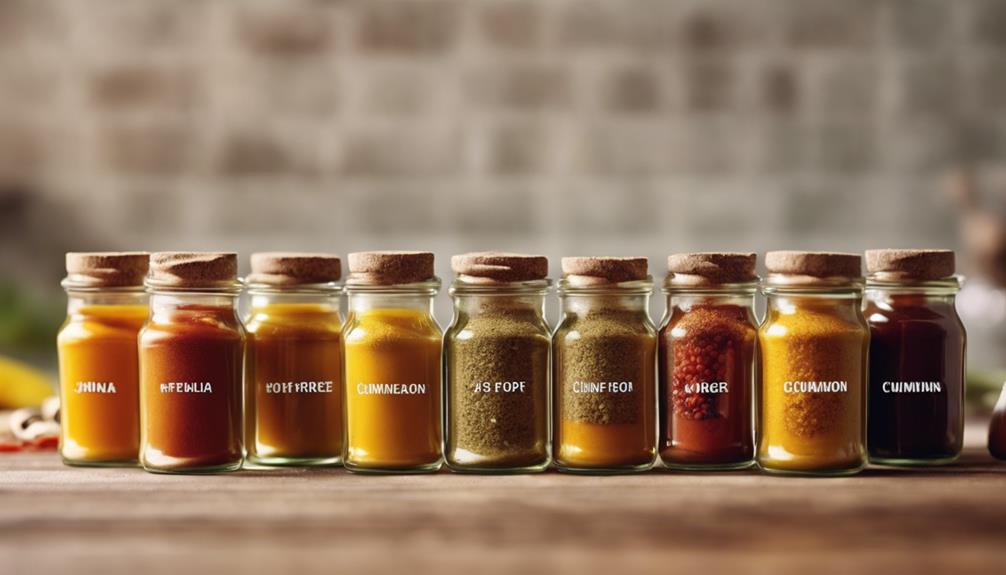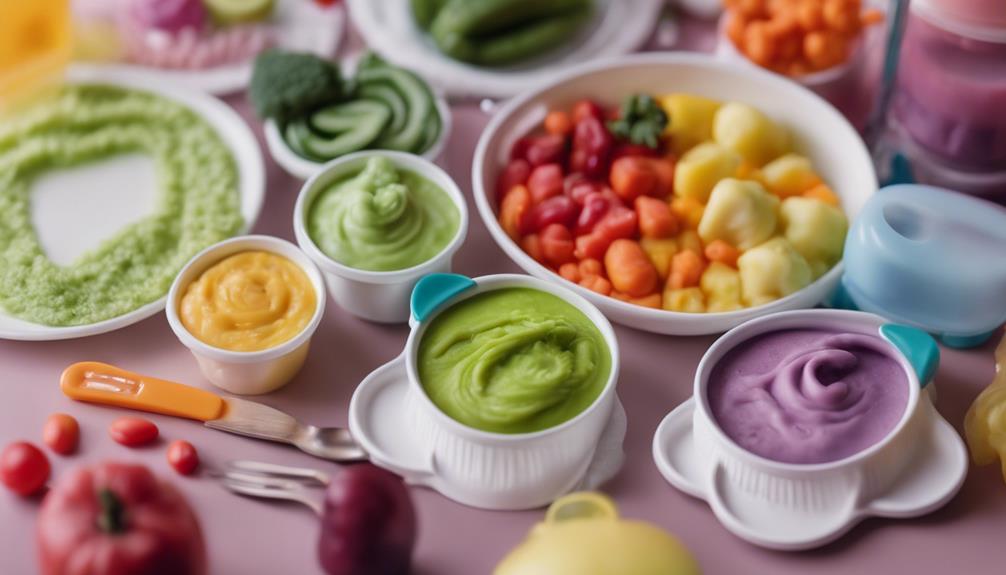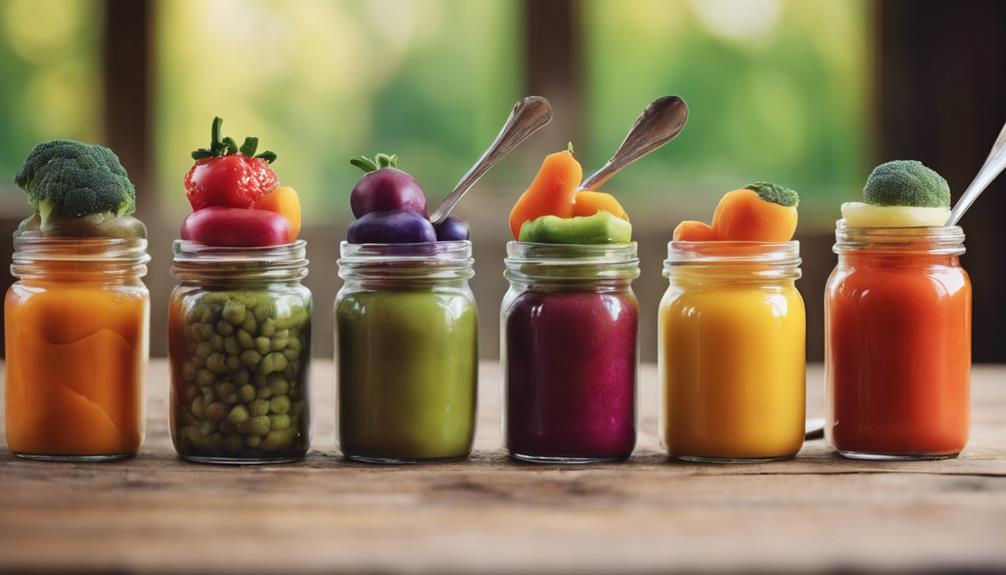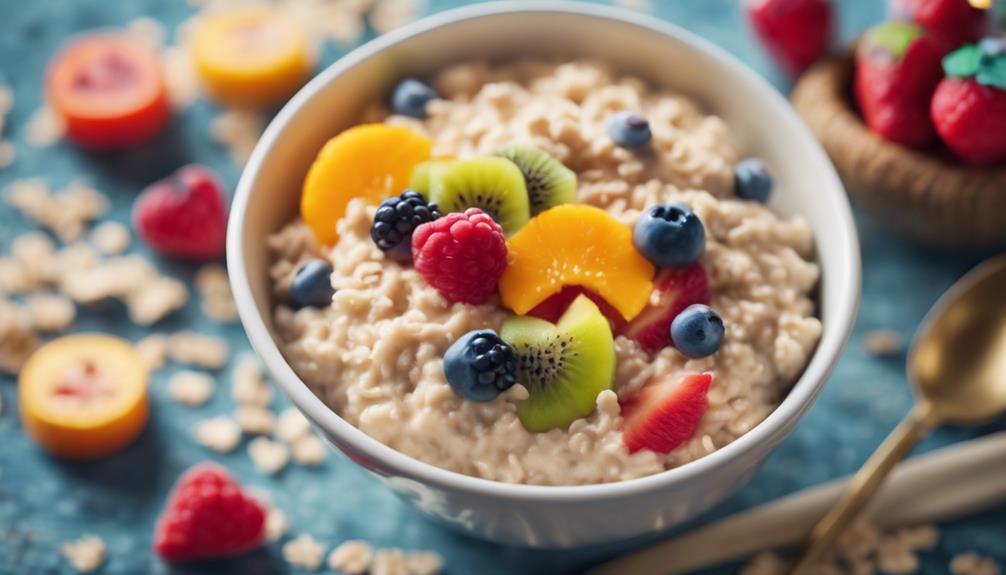Discover the world of stage one baby food recipes, perfect for your four-month-old. Begin with single-ingredient purees like Potato, Carrot, Butternut Squash, and Sweet Potato. Add some Cinnamon for warmth, Ginger for digestion, and Turmeric for anti-inflammatory benefits. Securely store in airtight containers or freezer trays for freshness. Equip yourself with essentials like a high chair, spoon set, and bib for a smooth feeding process. Make sure food temperature is safe and introduce cups for a positive mealtime environment. Choose fresh organic produce and monitor for allergies. Embark on this journey for a healthy culinary experience for your little one.
Key Takeaways
- Start with single-ingredient purees like Potato and Carrot for 4-month-olds.
- Introduce baby cereal gradually to enhance nutrition and texture.
- Experiment with spices like Cinnamon and Ginger to broaden taste palate.
- Utilize freezer trays for convenient storage of homemade purees.
- Monitor for allergic reactions and introduce fresh organic produce for nutritious options.
Stage One Baby Food Recipes
Introducing your little one to Stage One baby food recipes is an essential step in their culinary journey towards exploring new flavors and textures. These recipes are designed for babies who are just starting solids, typically around 4-6 months old. Stage One baby food focuses on single-ingredient purees like Potato Baby Food, Carrot Baby Food, Butternut Squash, and Sweet Potato Baby.
Homemade Stage One Foods for Babies are easy to prepare at home using a blender or food processor. By making Homemade Baby Food, you can guarantee that your baby is getting fresh and nutritious options. Baby Cereal is also a common addition to Stage One baby food recipes.
These simple fruits and vegetables help introduce your baby to a variety of tastes and textures. Controlling what your baby eats through these Food Recipes for Babies is a great way to instill healthy eating habits early on.
Spices in Baby Purees

Enhance your baby's purees with a variety of spices to introduce new flavors and potential health benefits. Including spices like cinnamon, ginger, and turmeric in baby purees not only adds depth to the taste but also offers nutritional benefits. These spices can aid in digestion, boost immunity, and provide anti-inflammatory properties. Introducing different spices early on can help broaden your baby's palate, making them more receptive to diverse flavors as they grow, and potentially reducing picky eating tendencies in the future.
To make the most of spices in baby purees, consider incorporating the following options into your recipes:
| Spice | Benefits |
|---|---|
| Cinnamon | Adds warmth and sweetness |
| Ginger | Assists in digestion |
| Turmeric | Offers anti-inflammatory properties |
Storage and Freezing Tips

To secure the longevity and quality of your homemade baby food, it's essential to grasp proper storage and freezing techniques. When storing baby purees, use airtight containers in the fridge to retain freshness and guarantee safety.
For freezing, opt for freezer storage trays that allow convenient storage and thawing of frozen puree when needed. Proper storage is vital to preserve nutrients and avoid spoilage, maintaining food safety for your little one.
Thaw baby food thoroughly before serving to maintain texture and consistency. By following these guidelines on how to store and freeze homemade baby food, you can be confident that your little one's meals aren't only delightful but also secure.
Feeding Essentials and Tips

When preparing homemade baby food, make certain you have essential feeding tools such as a high chair, suction bowl, spoon set, and a bib with a food catcher for a mess-free feeding experience. As your little ones start eating solid foods, utilizing these feeding essentials will make the process smoother.
Handling spoon throwing may be challenging, but disregarding it can discourage the behavior over time. Testing the temperature of homemade baby food purees before serving guarantees it's safe for your baby. Introducing cups to babies and creating a positive mealtime environment can help establish healthy eating habits early on.
Opt for fresh organic produce whenever possible to provide nutritious options for your baby. Remember to monitor for allergic reactions when introducing new foods. Feeding time can also be a bonding experience between you and your baby, fostering a positive relationship with food and promoting healthy eating habits in the long run.
Frequently Asked Questions
What Baby Food Should You Start First?
Start with single-ingredient purees like sweet potatoes, avocados, and bananas. Introduce one new food at a time for a few days to monitor reactions. Gradually progress to more complex flavors and consult with a pediatrician for personalized guidance.
What Should a Baby Eat in the First Month?
In the first month, focus on breast milk or formula to provide essential nutrients for growth. If advised by a healthcare provider, you might introduce single-ingredient purees like rice cereal or fruit purees towards the end.
What Are the Best Foods for First Time Baby?
When feeding your baby for the first time, start with simple purees like sweet potato and banana. Introduce iron-rich foods like meats and fortified cereals for their development. Gradually add new flavors and textures to expand their palate.
What Are the Best Purees for Babies First Food?
Begin with easy-to-digest choices such as sweet potato, avocado, and banana for your baby's initial foods. These purees offer crucial nutrients, assist in identifying allergies, and support the smooth shift to solid foods. Remember to introduce new foods gradually.
Conclusion
To sum up, introducing your 4-month-old to solid foods can be an exciting milestone in their development. With a variety of straightforward and nourishing recipes at your disposal, you can guarantee that your little one receives the necessary nutrients they need to flourish.
Remember to follow proper storage and freezing techniques to uphold freshness and quality.
As you begin this new journey of feeding your baby, keep in mind that patience and consistency are crucial in establishing healthy eating habits.









